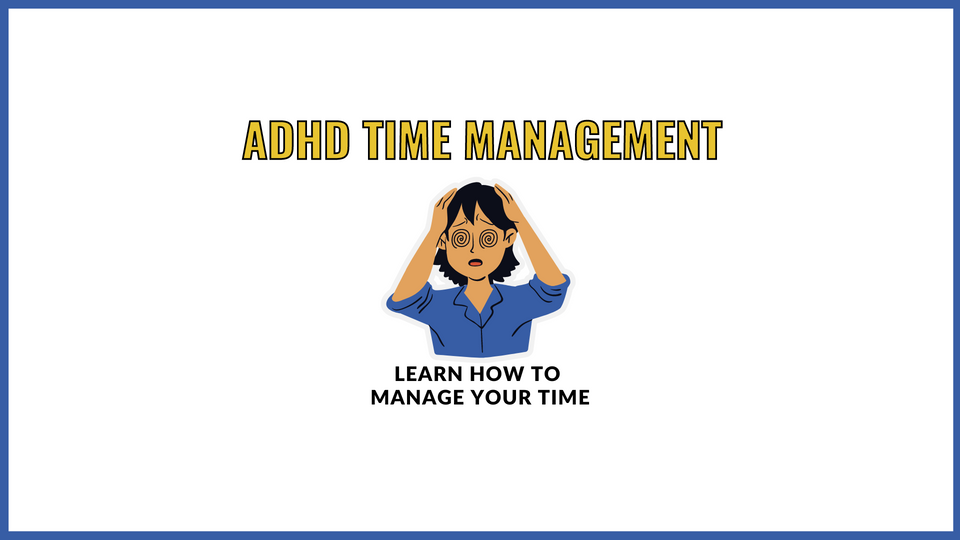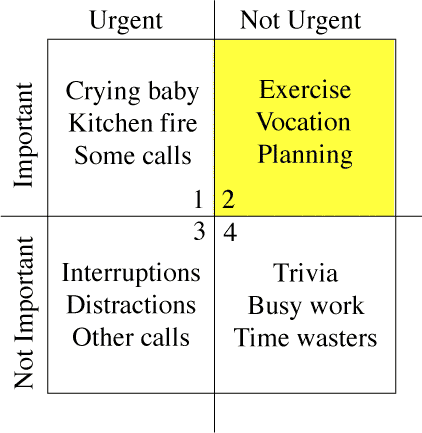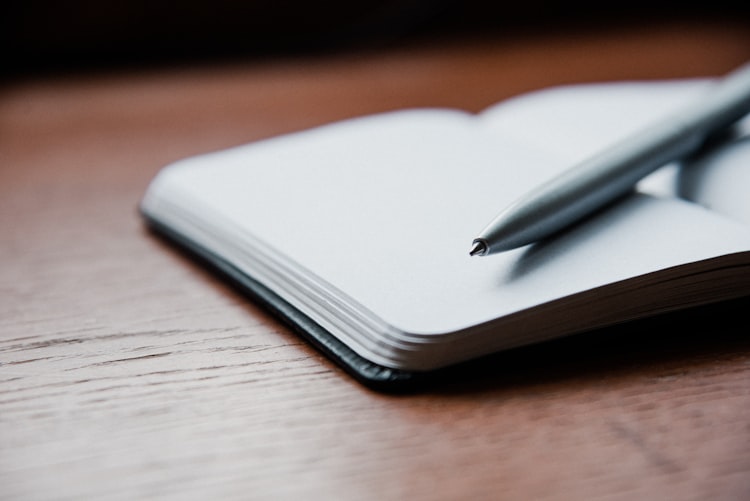ADHD and time management for developers

ADHD can be a pain in the *** and a bit of a struggle, especially in carrying out your daily activities as a developer or techie, which is emotionally tasking and mentally draining.
This article will review tools, tips, and tricks to make it easier for you and make each day better than the last.
Table of Contents:
- What is ADHD
- Dealing with ADHD time blindness problem as a developer
- Dealing with ADHD time perception problem as a developer
- How to deal with common ADHD problems
- Best practices to manage time and ADHD
- Three time management techniques to remember
- Time management tools for developers with ADHD
- Conclusion
What is ADHD
ADHD is an acronym for Attention Deficit Hyperactivity Disorder, a mental disorder affecting human behavior. People with ADHD are mostly restless, have difficulty concentrating, and are impulsive.
Some symptoms tend to be noticed at an early age of 3-8 years; this may become more noticeable when the child changes an environment, such as relocating or starting school. This diagnosis varies and could be later in childhood. Sometimes, this could lay dormant during childhood and exhibit in adulthood.
Like how everything changes with time, the symptoms of ADHD usually improve with age. Still, most diagnosed adults with the condition at a young age continue to experience the same problems.
People with ADHD may also have additional troubles, such as sleep disorders, anxiety disorders, and dyslexia.
Time management is the ability or concept of managing your time to complete your daily tasks; it feels like a foreign concept to people living with ADHD.
People with ADHD face some specific problems that make it harder to manage their time.
Dealing with ADHD time blindness
What is a time blindness problem?
Time Blindness is a term that explains when someone with ADHD is in a state where their brain becomes unconscious and can't interpret sensory inputs such as pulse rate, light levels, and temperature change as an indicator of time passing. In other words, it is the lack of noticing when time passes, or an environment changes. Most times, people that suffer from time blindness may not recall what happened within that time.
How to cope with time blindness as a developer?
- Consciously track time: When you track your time intentionally, it prevents or tries to bring you out of the state of time blindness. You can track your time by using any time tracker app or a simple worksheet or Developer Diary.
- Increase your dopamine level: Time blindness could be triggered by dopamine decrease, and giving yourself a dopamine boost could be helpful. You can increase your dopamine level by eating food rich in vitamin D, such as bananas or peas, drinking coffee (coffee is a stimulant), and exercising.
- Listen to happy music: Music is a great way to keep people focused, happy, or sad. Happy music could help you get excited and happy; this helps increase your dopamine level.
Dealing with ADHD time perception
What is a time perception problem?
Time perception is a significant problem that people with ADHD suffer. This is the state of difficulty in acknowledging the amount of time spent on a task. This occurs when you get too hyper-focused and lose track of time you were meant to spend on that task.
How to cope with time perception problems as a developer?
- Schedule breaks: Scheduling breaks could help greatly, and you won't be so wrapped up in your task. This could be every ten minutes, break every forty or fifty minutes.
- Use visual timers: The use of visual timers can be helpful because, every once in a while, your brain will remind you to take a sneak peek at your clock or watch. This will reduce hyper-focus.
- Medication: The use of prescribed medication could not be more emphasized, it helps keep you in check, and your mind won't be stuck on one thing. The medication affects people differently but also enables you to deal with ADHD.
How to deal with common ADHD problems
Getting your brain to carry out a task is difficult when you can't focus on anything. These tips will give you power over your brain. Scenarios and tricks will be discussed here.
Here are some tricks to help your day
- Trying to get your work done in a noisy office space?
If you notice your coworker is chatty, you can't tell them off, so you don't hurt their feelings. You can use a noise-canceling headphone or add a Do-Not-Disturb sticker to your chair; this will for sure tell your coworker you don't want to be distracted, and they might respect that. If that doesn't work, talk to your manager and switch space to somewhere close to a wall. This will prevent you from the standard chaotic work office.
2. Struggling to focus on a task for an extended period?
If you notice you have to focus on a task for more than two hours and are struggling, you can set a five to ten-minute break after forty minutes of working on your tasks. It gives your brain time to relax after reboot and helps you think better, mainly if you use more brain power in executing your job.
3. Can't stay still at a meeting or event?
If you constantly fidget during meetings or can't stay in a place for a long time. Try to work around every twenty minutes if it won't distract anyone or the forum. Another option is to squeeze a stress ball or anything squeezable; ideally, you can make a squishy ball by tying rubber bands together or squeeze paper into a ball and use that when you are about to zone out.
4. Struggling with working remotely with people around?
If you have a home office and your kids or spouse or friends or family keep distracting you from sending that PR or design to your team, isolate the noise and distractions by setting up a Do-Not-Disturb mode on your devices, putting up a sticker that says "Keep off" or "Do Not Distract" if you can find one. Then, use headphones or earphones to avoid the noise. Moving the desk to the wall away from the door can also prevent you from constantly leaving the office often.
5. Do you multitask and get no work done?
If you multitask and get nothing done, you can schedule your daily task by allocating time to each task, i.e., two hours to work on an X endpoint or five hours to design a fintech system. This makes it easy for you to concentrate on one thing at a time, and you will get more done if you allocate time.
6. Do you get easily stressed/tired working from home?
If you work from home, this could be an opportunity to spend some time outdoors. You could either go to a park or talk for a walk around your neighbourhood or eat outside. You don't have to do this daily but at least once weekly. This helps you relax more because nature is beautiful and relaxing. Also, a change of scenario is excellent for the health.
7. Do you easily zone out or overthink a lot?
If you find yourself zoning out a lot or overthinking a thought or an idea during work or personal time, jot it down. This way, your brain won't dwell on the thought or idea for long, and you can get back to what you were doing and finish on them.
8. Having difficulty saying no?
Suppose you notice it's difficult to say no, which affects you significantly. In that case, you can start practicing it because you can't do something that makes you uncomfortable every time and disregard your principles to make someone else happy while you feel sick or wrong. This will definitely be stern at first, but it won't be that bad anymore when you think of how glad you will be.
9. Struggling to start a task at the right time?
If you notice you start your task at the wrong time or start late, the allocated time isn't enough. You can schedule your task five minutes earlier; this gives you time to start your laptop, arrange the space and think of the task, and it won't feel like you started late.
10. Do you get easily frustrated when you run into code errors?
Try meditating if you get frustrated easily because you are trying to remember or focus on a chore/task. Mediation has proven to be relaxing and frees your mind of its worries. At that point, you won't think of anything but the relaxing music and the calmness around you.
11. Struggling to get up in the morning?
If you notice you go to bed late and wake up late, you can create a "bedtime" routine and a "wake-up" schedule. If you become strict about this schedule, it limits your usage of devices that could make you stay up late. Also, going to bed early helps your brain rest enough to take on the stress of the following day.
12. Trying to keep up with the deadline for payment of bills?
If you keep forgetting to pay your bills, set up a bill pay reminder to remind you to pay your light, water, and phone bills a day before, the day you should pay them, and an hour before the scheduled time to pay the bill.
13. Do you lose basic things often?
If you find yourself looking for the most essential thing you need like keys, pens, notepads. Try keeping them on a spot you use daily or spots your mind goes to first. For example, keep your notepads on your desk where you work and your keys on a table next to your door so you can quickly grab them and leave the house without turning the apartment upside down.
14. Struggling with intrusive thoughts?
If you find yourself having more intrusive thoughts lately and it is difficult to get anything done, you can tear a piece of paper, jot the thought down, read it, and burn it. This will help you forget the thought after a few minutes or hours. It also tells your brain that it is just a thought that can come and go at any time, and it doesn't mean you need to act on it.
15. Struggling with impulsive shopping?
If you find yourself shopping every time and you wish to stop. Create an online banking app for all your transactions - this may take a long time, but it is worth it in the end - and use it to assign a specific amount to each need. This gives you a limit that will likely stop impulse shopping and keep receipts of all your transactions.
16. Can't remember directions?
If you forget directions a few minutes after you were just told. Take a small note and a pen wherever you go so you can quickly jot down the guides once you hear them, and you could also say it out loud, like repeat after the person. Naturally, your brain remembers 70% of what you say, especially if you say it aloud.
17. Struggling to motivate?
If you find it hard to focus because you don't feel motivated, a good way to motivate yourself is by via accountability and feeling a part of a community trying to achieve the same goals. And for that you can plan to work with your friend during same time and share your goals of the day with them. If your friends cannot join you for any reason, you can join some online community such as Invide community on discord where people from different places work together in deep work sessions at planned time.
Best practices to manage time and ADHD
Living with ADHD is exhausting as a developer, and you will often feel stuck or helpless. This guide section will give you possible best practices to make your day-to-day less hyper and more fun.
Here are some best practices to make your brain less tired
- Always take your Medications
Many will agree that prescribed medications cure or are the solution for ADHD, which is wrong. ADHD has no cure, and as someone living with it. You can only prevent it as humanly as possible. Take it as prescribed by the doctor and avoid skipping them no matter what you feel; it keeps hyperactive you at bay, right? More reasons why you should take them.
2. Talk to a Professional weekly
Talking to a professional helps you understand your triggers and how to manage them better. They don't solve all your problems, but they are there to help you through tricky times and offer advice to improve your bad times. It is advised to talk to someone weekly so he/she can help you track your week and understand you better.
3. Track your time
Tracking your time can be very helpful, especially when you often lose time. It is advised to use visible clocks or wristwatches to track your time. Whenever you are set to achieve or complete a task, take note of the time by writing it down and saying it out loud. This helps your brain remember the time, and the message can be next to your workspace so you can quickly check it.
4. Prioritize your day
Before you start your day, create a to-do list of your day's schedule. Visualize your day in words and note what you need to do. Once done, take another sheet of paper and prioritize the vital task for the day; you can use colors to specify the critical to the slightest crucial task of the day. This helps your brain know what to focus on at the moment and keeps it from multiple tasking.
5. Set a budget every month
Impulse buying is a severe symptom people with ADHD suffer from. It affects people differently, but at one point, you may have suffered from this and maybe gone broke.
Setting a budget at the beginning of a month helps you track your expense and lets your brain know that you only have a certain amount to spend a month. It also allows you to buy only what you need when you know your limit.
6. Have a diary or journal
Journaling may seem childish, but it helps you track what goes on in your head. When you have any random thoughts or essential tasks, or intrusive thoughts, jot them down. This keeps your brain from overthinking that thought or idea. When you write it down, your brain moves on to something else, except if you focus on the written note. If you keep missing journaling because you need to find your journal or your find it hard to note down, try using digital note-taking accessible via quick shortcuts right where you work - your laptop.
7. Exercise as often as possible
Exercising can relieve stress; choose something fun yet vigorous and stick with it. It may not be daily but do this at least three times a week. Research shows that exercise helps your brain take a breath, relax and enjoy the moment while your body releases its tension when constantly sitting in a place. It also changes your mood; you will notice you will become more relaxed, sweaty, and happy after exercising.
8. Sleep early
Sleep can help a lot more than you know; it helps reboot our brains, and the earlier you sleep, the less likely you will be to forget something. Research showed that those who don't sleep enough, i.e., those who sleep for less than five hours, are likely to be forgetful and might even get dementia or Alzheimer's later in life. After a deep, relaxing sleep, your brain becomes more active and more concentrated, and your day will just become better.
Three time management techniques to remember
Techniques help you get your job done when you feel stuck or lost; here are some techniques and worksheets that improve your day.
Not every technique works for everybody. ADHD affects people differently. So try one technique at a time, mould it to suit you and see how this makes your life better.
Pomodoro technique
Take 5 mins of break after every 25 mins of focused work. You can set this break vs work time as it suits you. The key is to take these short breaks frequently but as per the plan only so you don't feel the urge to take break while you're focusing on the work in those focused 25 mins. Also you might need to push yourself a little bit to focus on work during the work period but making it small enough(e.g. 25 mins) creates only a tiny challenge. And once you build this habit of tackling this challenge to remain focused for 25 mins, you can increase that challenge and aim for longer focused time. You can increase the break time accordingly.
Pareto principle
In order to drive great outcomes, you don't need to do each and everything that comes your way. This principle is about focusing on 20% of the tasks that generate 80% of the output. This is also known as the 80/20 rule.
Eisenhower matrix
Using this technique helps you setting your day-to-day tasks right and avoid wasting the day on unnecessary tasks. In this technique, you manage tasks based on their importance and urgency as follows
- Focus on doing the important and urgent tasks immediately
- Schedule important and not so urgent tasks for a later date
- Delegate urgent and not so important tasks
- Drop not so important and not so urgent tasks

Time management tools for developers with ADHD
The use of modern technology can bring a lot of relief to those living with ADHD; it also makes things like tracking and focusing less stressful.
- Calendar: This is an application that lets you schedule your day-to-day activity. You can also use Notion to schedule tasks for the day.
- Website blocker: This app helps you when you want to focus on a task but don't be distracted or sidetracked, so you can use this tool to block all random, unnecessary pop-ups. Such tools are BlockSite, Get Cold Turkey, and Freedom.
- Developer Diary: A minimalistic diary for developers that also helps you understand your work behaviors and make the adjustments in your work accordingly
- Forest: This is a focus-centered application. This helps you meditate and also enables you to free your mind.
- Voice assistants: This tool comes in handy when you need to set a task or schedule a meeting but don't want to leave your desktop. Every operating system has a different voice assistant, and they are primarily free, i.e., Mac/iPhone has Siri, Windows has Cortana and Linux has DragonFire.
- Tile: This mobile/web app helps you to locate your misplaced items. When your brain is distracted, it loses track of what you do. This app can locate and remind you of leaving the essential items you lose.
- PomoDone is an app that lets you connect any project management tools. It helps you keep track of all your tasks, events, and activities, primarily if you work in a busy tech environment. It also reminds you of the task, and you can check it once done.
- Bullet journal: This is a helpful app when you need to keep track of your day-to-day activity, or you want to jot down that random thought.
- A smartwatch is needed when you are too busy to jot things down or randomly misplace your pen or pencils. This device lets you turn text by using speech.
- A jar of success is a tool to note down all your achievements and accomplishments; this is an excellent way to fight your fears and validate yourself. This could be done daily or weekly, or monthly.
Conclusion
In conclusion, living with ADHD is complex. But now, you have a set of mental models and the toolbox that will help you make your day better.






Member discussion